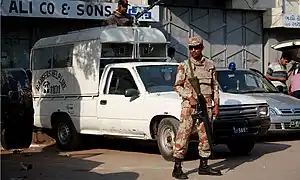| Operation Zarb-e-Ahan | |||||||
|---|---|---|---|---|---|---|---|
| Part of Organised crime in Pakistan | |||||||
 A ranger in Sindh, their Punjabi counterparts were instrumental in the operation’s success | |||||||
| |||||||
| Belligerents | |||||||
| Chotu gang | |||||||
| Commanders and leaders | |||||||
|
|
Ghulam Rasool (POW) Pyara Rasool (POW) other local commanders | ||||||
| Strength | |||||||
| 2,400 | 300 | ||||||
| Casualties and losses | |||||||
|
| 54 killed, 175+ arrested | ||||||
| 24 policemen held by the Chotu gang released | |||||||
Operation Zarb-e-Ahan was an operation conducted jointly by the Pakistani military and local law enforcement.[3] The operation targeted the Chotu gang, a band of dacoits who regularly committed murders, kidnappings, and highway robbery. The operation was successful, with many gang members being killed and captured, including its leader, Ghulam Rasool.[4] Afterwards, the government consolidated their control, and the Chotu gang became defunct.
Background
The Chotu gang was a Pakistani gang that engaged in kidnapping, murder, smuggling, gun-running and highway robberies led by Ghulam Rasool who goes by the alias, "Chotu." The gang was based in the Kacha area of Rajanpur.[5][6][7] The gang was involved in many crimes in areas surrounding areas of the Rajanpur.[8]
The gang was also known for abducting people from Karachi, Baluchistan and Rahim Yar Khan.[9] Punjab police conducted multiple operations against them, all of them ending in smoke. The Punjab police conducted their first operation in 2010, which continued for three months without results. The Punjab police also held an operation in 2013.[8] The gang used light and heavy weapons procured from Afghanistan, including light machine guns, heavy machine guns and an anti-aircraft gun.[10]
A suicide bombing in Lahore, had links with dacoits in South Punjab, resulting in a harsh response by the government.[11]
Battle
The Chotu gang, using their familiarity of the terrain to their advantage, decided to stay in a heavily forested riverine island called Kacha Jamal.[12] The trees covered their movements, forcing security forces to fight on the gang's terms. Police forces attempted an amphibious landing, engaging in a firefight with the gang, but were outwitted, resulting in seven policemen being killed and 24 being abducted.[13]
It was clear that the threat of the gang had gotten out of hand, and as a result the army took control of the operation. The army, seeing that the Chotu gang had the advantage on ground, took the fight to the air, dispatching attack helicopters.[14] These attack helicopters were then used to pound the gang's hideouts and outposts, killing many gang members and forcing many more to flee, many of who would be captured later.[15]
On April 18, the army dropped pamphlets to the gang via helicopter, and warned of a sweeping assault if they did not surrender.[11]
Chotu surrenders
Only two days later after the ultimatum, Chotu, along with 170 of his gang members, surrendered to government forces.[11] This came out of the gang leader, Ghulam Rasool, unwilling to be labelled a terrorist, and recognising it was not possible for the gang to resist the army.[12]
Aftermath
The convicts included Ghulam Rasool alias Chotu, his brother Pyara, Nadir, Deen Muhammad, Khalid alias Khaldi, Ishaq alias Bilal, Akram alias Akri, Ghulam Haidar, Hakim, Razzaq, Majid, Nasir, Sher Khan, Jumma alias Bhutta, Rasheed, Behram, Bashir, Abdul Wahid, Mujeeb-ur-Rahman, and Hussain Bakhsh.[16]
The convicts were awarded death sentence on six counts under Section 302 of Pakistan Penal Code, six counts under Section 7 of the Anti-Terrorism Act and another six counts under Section 3 of the Explosive Substance Act 1908.
The convicts were also charged with Rs. 6.2 million fine each or undergo additional imprisonment in case of default. All the 22 convicted would also undergo life imprisonment.[16]
References
- ↑ "Chotu gang surrenders before Pak Army, captives released". thenews.com.pk. Retrieved 2024-01-06.
- ↑ "Chotu surrenders". thefridaytimes.com. Retrieved 2024-01-06.
- ↑ "The bitter truth about Chotu's gang". The Nation. 2016-04-22. Retrieved 2024-01-04.
- ↑ Gabol, Dawn com | Imran (2016-04-20). "Chotoo, gang members surrender unconditionally to army: ISPR". DAWN.COM. Retrieved 2024-01-04.
- ↑ "Small matter of the Chotoo gang - Newspaper". Dawn.Com. 15 April 2016. Retrieved 2016-04-15.
- ↑ "Chotu Gang takes a heavy toll on raiding police". Nation.com.pk. Retrieved 2016-04-15.
- ↑ "Operation Zarb-e-Ahan: Every terrorist will be eliminated, says Sukhera - The Express Tribune". Tribune.com.pk. 2016-04-11. Retrieved 2016-04-15.
- 1 2 Gabol, Dawn.com | Imran (2016-04-20). "Chotoo with gang members surrenders unconditionally to army, says ISPR". www.dawn.com. Retrieved 2016-04-20.
- ↑ Gabol, Imran (2016-04-16). "The rise of Chotoo and his gang". www.dawn.com. Retrieved 2016-04-20.
- ↑ "Who are Pakistan's Chhotu bandits?". BBC. Retrieved 2016-04-19.
- 1 2 3 "Chotu surrenders". The Friday Times. 2016-04-22. Retrieved 2024-01-06.
- 1 2 Syed, Imran Gabol | Baqir Sajjad (2016-04-21). "Army vows to clear all no-go areas in Punjab". DAWN.COM. Retrieved 2024-01-06.
- ↑ "Chotu gang surrenders before Pak Army, captives released". The News International. 2016-04-20. Retrieved 2024-01-06.
- ↑ "Army helicopters strike Chotu gang in full-scale Rajanpur offensive". The Express Tribune. 2016-04-18. Retrieved 2024-01-06.
- ↑ Alam, M. M. (2016-04-15). "Gunship Helicopters commence targeting Chotu Gang bandits". Home - News Pakistan TV. Retrieved 2024-01-06.
- 1 2 "Chotu Gang leader among 22 awarded death sentence". www.thenews.com.pk. Retrieved 2019-03-14.